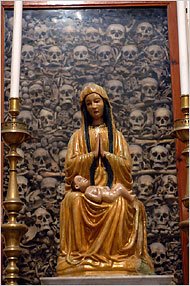
made below (and an exuse to bring that conversation back to the top of the thread), I just came across this quote from Gustavo Gutierrez (Gutierrez tends to write in very complete thoughts, so we'll have to get a running start):
Every theology is a discourse about God; in the final analysis, God is really the only theme of a theology. But the God of Jesus Christ comes to us as a mystery! A sound theology is therefore conscious that it is attempting something extremely difficult, if not impossible: to think and speak about this mystery. ThisGustavo Gutierrez, The Truth Shall Make You Free: Confrontations, tr. Matthew J. O'Connell, (Maryknoll, New York: Orbis Books, 1991), pp. 54-55.
accounts for the well-known warning of Thomas Aquinas: "We know more of what God is not than of what God is." It is important to be clear on this point at the very beginning of any discourse on the faith, for God is truly more an object of hope (which respects mystery) than of knowledge.
How, then, are we to find a way of speaking about God? From the viewpoint of liberation theology it must be said that we must first contemplate God and put God's plan for history into practice and only then think about God. What this statement means is simply that adoration of God and the doing of God's will are necessary conditions for thinking about God. Only within the framework provided by mysticism and practice is it possible to develop a discourse about God that is both authentic and respectful of its object. It is in practice and, concretely, in our actions toward our neighbor, especially the poor, that we enounter the Lord, although at the same time this enounter deepens our solidarity with the poor and makes it more authentic. Contemplation and historical commitment are indispensable and interrelated dimensions of Christian existence. The mystery that God is reveals itself in contemplation and solidarity with the poor. Contemplation and commitment make up what liberation theology calls practice, the "first act," which is Christian life itself; only then can this life inspire "second acts," a process of reasoning.
Granted, Gutierrez places this in the context of theology; but I think it is sound epistemology, as well.
No comments:
Post a Comment